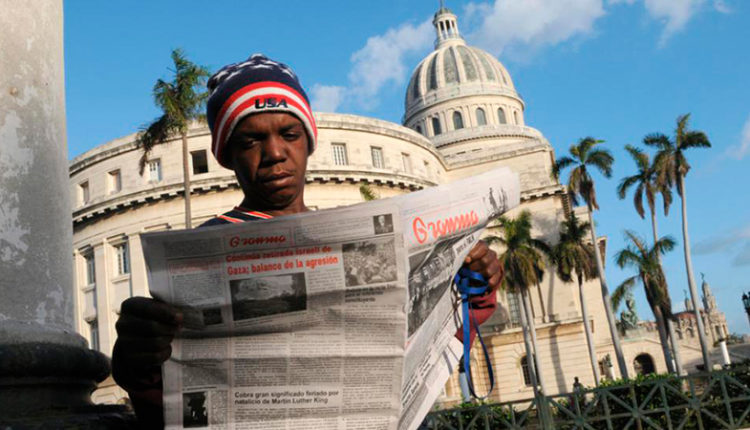 Photo from Havana Times
Photo from Havana Times
A more coherent press law is needed
HAVANA – A new law, or policy, can be an opportunity: to reinvent, to project into the future, to model a desired state. It can be those things, or not. When the country’s future press law is discussed among Cuban journalists, it seems that expectations surpasses reality.
But let’s start with the good. The presentation of the document — which is not the final document — is based on a fairly honest study of the current communications and media situation in Cuba. It states, for example, that the updates in the economic and social situations have not been accompanied by an adequate communications strategy.
It also recognizes external overregulation over the media, its material limitations and technological delays, the prevalence of an informative and unidirectional vision of communications, low salaries, and the idea of technologies as a “danger zone.” The inventory of deficiencies includes manifestations of de-professionalization, and lack of immediacy and depth in the production of information.
Among its principles, the text establishes fundamental notions such as respect for diversity, and the fact that information and communications constitute a public good and a citizen’s right.
Now, this text assures us that the new policy is based on the Constitution. We then dare ask, which one? The current one, or the one that will result from the process of reform? And will the policy’s approval wait for the new Constitution? Isn’t the new magna carta supposed to also update its precepts regarding communications and the press?
One fundamental question being asked by many journalists has to do with access to sources and information in the public arena. The policy ensures that media directors are responsible for the execution of the information policy based on the “Guidelines of the Political Bureau of the Central Committee of the Communist Party to increase the informative effectiveness of the country’s mass media” (2007).
However, towards the bottom of the text it says that state and government institutions, within the framework of their abilities, regulate and control compliance of the policy’s principles regarding the contents distributed through the different channels. Where and what is that framework? we ask. And what is the red line that tell us how far we can go? Who decides, and how is it determined, what information is available to the public? And finally, how will they carry out this “control” when the policy stresses the excess of external regulations over the media?
The documents, both guidelines and the policy, have binding force; ergo, compliance is not mandatory. The difference is that the current policy will serve as the foundation for a legal framework. That is why there are issues that must be resolved and clarified definitively. Now. Because once it becomes a legal norm it will be too late.
For example, the policy confirms that the media will be state or social property, and never privately owned. However, it does not refer to other possibilities such as cooperatives or community property, which have been considered.
It also omits the multiple non-state media that operate in Cuba today by simply stating in its study the presence of private digital media hosted on servers outside the country “which develop an agenda that is hypercritical and has the intent of demobilizing.”
First, the term “private” is used with the intent of disqualifying, which does not make sense in a country where half a million persons are self-employed; and especially when the Conceptualization of the Economic and Social Model recognizes this type of property. Secondly, not all these media share the same agenda. And finally, one may like it or not, but it is impossible to ignore them, or to label them as counterrevolutionaries. Period.
Because the Internet exists, and other technologies exist, in this context we are all potential media producers. Because a society like the Cuban, diverse, plural, globalized and transnational, can not always have homogenous and monotonous press as it has had up to now. Socialism implies socialization, wealth, power, and also communication.
In his book, Revolution, Socialism, Journalism. The press and Cuban journalists in the 21st century, professor Julio García Luis points out: “If in the field of production and services we are beginning to liberate the productive forces, this would be equivalent, in an intellectual field of particular importance, to liberating the journalistic talent of everything that today binds and constrains it.”
This future press policy has been presented as complete, finished. Many professional journalists would have wanted to participate in the elaboration of the policy. In fact, it is not known whether this debate will influence the final document.
Another novelty has to do with how to finance the media. Alternative ways to generate income, including advertising and sponsorship, will be sought, without these measures meaning withdrawal from the state budget. Creative and audiovisual producers should also be defined and legalized.
Among the actions proposed by the policy is the update of copyright rules. In this case, then it is necessary to mention the Weekly Package and other forms of informal content distribution not mentioned. The new policy also prioritizes infrastructure, connectivity and access to technologies. And according to the policy, a state body will be created to carry out these future plans.
A spirit of civility predominates in the policy’s objectives, which aspire to strengthen the culture of dialogue at a social, institutional and community level, and participation of popular control; as well as contributing to the generation of an atmosphere of legality, protection of the environment, values and discipline.
But coherence between what is declared and how things proceed is important. One can not preach dialogue and participation, while declaring a semi-secret public policy — especially when it deals with communications and the press. Doing the same, gives you the same.


